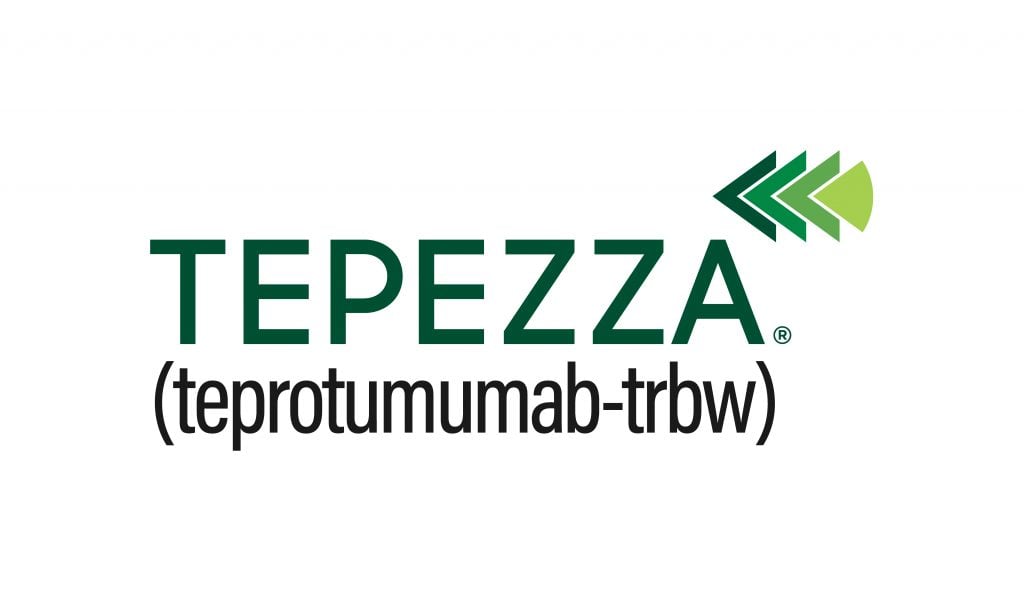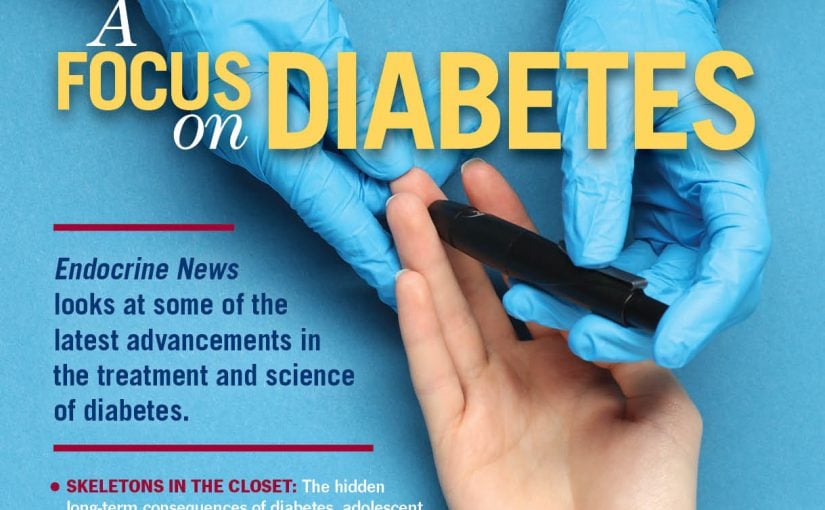An Endocrine News roundup of the week’s pharmaceutical news, breakthroughs, and general information. *
TEPEZZA Receives Approval in Japan to Treat TED
On Sept. 24, Amgen announced that TEPEZZA® (JAN: Teprotumumab (Genetical Recombination)) has been approved for the treatment of active or high clinical activity score (CAS) thyroid eye disease (TED) by Japan’s Ministry of Health, Labour and Welfare (MHLW).
TED is a serious, progressive and potentially vision-threatening rare autoimmune disease that can cause proptosis (eye bulging), diplopia (double vision), eye pain, redness and swelling. There are approximately 25,000 – 35,000 people living with TED in Japan, inclusive of both active and chronic (low CAS) TED. TEPEZZA is now the first and only medicine approved in Japan to treat active TED. A separate trial to study the efficacy of TEPEZZA in chronic TED patients in Japan is currently ongoing.

“This is the first approval for TEPEZZA in Asia and marks a significant milestone for the global treatment of TED,” said Jay Bradner, MD, executive vice president, Research and Development, and chief scientific officer at Amgen. “Historically, patients with TED have been managed with complex surgeries and high-dose steroids, which can cause further complications. With TEPEZZA, doctors have a nonsurgical and nonsteroidal option that treats a root cause of this debilitating disease.”
TEPEZZA received orphan drug designation in Japan, which provided a nine-month regulatory review period compared to the standard 12-month review. The approval was based on the positive results of OPTIC-J (jRCT2031210453), a Phase 3 randomized, double-masked, placebo-controlled, parallel-group, multicenter study evaluating the efficacy, tolerability and safety of TEPEZZA in the treatment of patients with active TED in Japan.
The primary endpoint in the trial was met, as 89% of patients treated with TEPEZZA had a clinically meaningful improvement in proptosis (≥2 mm) compared with placebo (11%; p<0.0001) at week 24. The safety profile was consistent with the complete body of clinical data supporting TEPEZZA.3 A second Phase 3 clinical trial is ongoing in Japan evaluating TEPEZZA among adults with chronic TED and a low CAS (jRCT2031220730).
“People living with active TED can experience a significant burden of disease with symptoms that can make daily life difficult to navigate,” said Yuji Hiromatsu, MD, a professor emeritus at the Kurume University Medical Center and physician at the Diabetes, Thyroid and Endocrine Center at the Shin-Koga Hospital. “The approval of TEPEZZA in Japan is an important advancement for patients and offers a new treatment option that targets the underlying mechanism of the disease.”
In addition to Japan, TEPEZZA is currently approved in the United States, Brazil, and the Kingdom of Saudi Arabia, and is under regulatory review in Europe, Canada, and Australia.
Crinetics Submits New Drug Application for Paltusotine for the Treatment of Acromegaly
On Sept. 26, Crinetics Pharmaceuticals, Inc. announced the submission of a New Drug Application (NDA) to the U.S. Food and Drug Administration (FDA) for paltusotine, the first once-daily, oral, selectively targeted somatostatin receptor type 2 nonpeptide agonist in development for the proposed treatment and long-term maintenance therapy of acromegaly.

“This NDA submission brings us one step closer to our goal of delivering a new generation of therapy that can help people living with acromegaly,” said Endocrine Society member and 2023 recipient of the Society’s John D. Baxter Award for Entrepreneurship, Scott Struthers, PhD, founder and chief executive officer of Crinetics. “Based on the comprehensive data from the Phase 3 PATHFNDR program, we are excited about the significance of this potential advancement for the acromegaly community, as well as what it represents to Crinetics as a company. Paltusotine is the leading candidate of a deep, innovative pipeline – the first of many therapeutic candidates that have been purposefully designed in-house to transform the lives of people impacted by a wide range of endocrine conditions.”
The NDA is supported by data from 18 clinical trials, including two Phase 3 trials that evaluated paltusotine for the treatment of acromegaly in medically untreated and treated patients. All primary and secondary endpoints were met in both Phase 3 studies. Treatment with paltusotine was well-tolerated and resulted in biochemical control and patient reported symptom control compared to placebo.
Crinetics anticipates receiving notification from the FDA on the status of the NDA submission in December.
Read more about Struthers in this Q&A from Endocrine News as part of an ENDO 2023 preview issue.
ABOUT PALTUSOTINE
Crinetics’ lead development candidate, paltusotine, is the first investigational once-daily, oral, selectively-targeted somatostatin receptor type 2 (SST2) nonpeptide agonist that has completed Phase 3 clinical development for acromegaly and is in Phase 2 clinical development for carcinoid syndrome associated with neuroendocrine tumors. It was designed by Crinetics with the goal of providing a once-daily, oral option for reliable and consistent control of acromegaly. In Phase 3 studies, once-daily, oral paltusotine maintained IGF-1 levels and symptom control in patients with acromegaly who were switched from monthly injectable medications (PATHFNDR-1) and rapidly decreased IGF-1 levels and symptom burden in medically untreated acromegaly patients (PATHFNDR-2). IGF-1 is the primary biomarker endocrinologists use to manage acromegaly patients. Results from the Phase 2 study in carcinoid syndrome will provide an opportunity for paltusotine to potentially demonstrate utility in an investigational, Phase 3 trial for another important indication related to the treatment of symptoms in patients with neuroendocrine tumors.
Septerna Announces Initiation of Phase 1 Clinical Trial for Hypoparathyroidism Treatment
On September 27, biotechnology company Septerna, announced the dosing of the first participants in its Phase 1 clinical trial of SEP-786, its novel, potent and selective, oral small molecule parathyroid hormone 1 receptor (PTH1R) agonist being developed for the treatment of patients with hypoparathyroidism.
The Phase 1 clinical trial is a single-ascending dose (SAD) and multiple-ascending dose (MAD) clinical trial to evaluate the safety, tolerability, pharmacokinetics (PK) and pharmacodynamics (PD) of SEP-786 in healthy adult volunteers.

Hypoparathyroidism is a debilitating endocrine disease caused by a deficiency of the parathyroid hormone (PTH) that results in a range of symptoms, including muscle cramps, fatigue, cognitive dysfunction, and life-threatening complications, such as cardiac arrhythmias, seizures, and renal failure. Conventional therapy requires patients take high doses of calcium and Vitamin D supplements orally several times daily or life-long daily injections of PTH replacement therapy.
“GPCR-targeted drugs have been the most productive target class in drug discovery history, with about one-third of all FDA-approved drugs targeting these receptors. Our proprietary Native Complex Platform™ fuels the discovery of oral small molecule compounds for a wide range of GPCRs, such as PTH1R, a validated receptor target for hypoparathyroidism,” said Endocrine Society member Jeffrey Finer, MD, PhD, chief executive officer and Co-founder of Septerna. “An oral small molecule PTH1R agonist has transformative potential as a convenient, disease-modifying treatment option that could provide patients with full-day calcium control, while resolving the serious effects of low blood calcium levels due to PTH deficiency. We look forward to assessing the safety of SEP-786 and its potential to normalize serum calcium levels, as we have seen in preclinical models, in this Phase 1 clinical trial. I am very proud of the rapid execution by our R&D team in achieving this milestone, which underscores the power of our Native Complex Platform™ to take on GPCR targets which have been historically challenging for small molecule drug discovery.”
The randomized, placebo-controlled, SAD and MAD Phase 1 clinical trial is expected to enroll up to 180 healthy adult participants. Dosing is underway in the SAD portion of the clinical trial, which will evaluate the safety and tolerability of SEP-786 at escalating oral doses. The MAD portion of the clinical trial is designed to evaluate the safety and tolerability of once-daily and twice-daily oral dosing of SEP-786 over multiple days of treatment with secondary endpoints including PK, changes in serum calcium and urinary calcium, and other biomarkers.
About SEP-786 and Hypoparathyroidism
Septerna is developing SEP-786, a novel, potent and selective oral small molecule parathyroid hormone 1 receptor (PTH1R) agonist for the treatment of patients with hypoparathyroidism, a rare endocrine disease characterized by a deficiency of the parathyroid hormone (PTH). Hypoparathyroidism results in a wide range of debilitating symptoms, including muscle cramps, fatigue, cognitive dysfunction and life-threatening complications, such as cardiac arrhythmias, seizures, and renal failure. Currently available treatments include supplements that only partially address PTH deficiency, or PTH peptide replacements, which require daily injections. Preclinical safety studies support that SEP-786 has demonstrated the ability to normalize serum calcium and was generally well-tolerated in 28-day Good Laboratory Practice toxicology studies. SEP-786 has the potential to be a differentiated treatment for hypoparathyroidism.
*Inclusion in Pharma Fridays does not suggest an endorsement by Endocrine News or the Endocrine Society.

